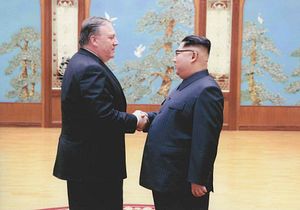On May 10, U.S. President Donald Trump announced that he and North Korean leader Kim Jong-un will meet in Singapore on June 12. The announcement came shortly after Secretary of State Mike Pompeo’s visit to Pyongyang for the second time to meet with Kim Jong-un and the dramatic return of the three Americans who were detained in North Korea. Preparation for the first-ever direct meeting between a sitting U.S. president and North Korean leader will no doubt intensify over the next several weeks.
The biggest focus for the upcoming Trump-Kim summit will be whether the two leaders can reach some kind of an agreement on how to deal with North Korea’s nuclear program, and if so, what such an agreement might look like. For instance, although Kim Jong-un and South Korean President Moon Jae-in pledged the denuclearization of the Korean Peninsula when the two met for the North-South summit on April 27 (and Kim repeated his commitment in a meeting with Chinese Foreign Minister Wang Yi the following week), there is great uncertainty about what Kim means by “denuclearization of the Korean Peninsula.” Many in the United States have argued that North Korea’s commitment to denuclearization of the Korean Peninsula means that Pyongyang, in exchange for giving up the nuclear weapons in their possession, will demand the removal of the U.S. nuclear umbrella over the Korean Peninsula (and in broader Northeast Asia, for that matter).
In fact, the kind of agreement over North Korea’s nuclear program that may emerge following the Trump-Kim summit next month can have profound impact on Japan.
For example, if the agreement that emerges only focuses on the United States’ most immediate concern — North Korea’s growing nuclear arsenal and its improving intercontinental ballistic missile (ICBM) capability — and leaves other security concerns regarding North Korea’s capabilities (such as its chemical and biological weapons and short-/medium-range ballistic missiles) unaddressed, it will not improve Japan’s security situation. Furthermore, should North Korea ask for the drastic restructuring of the U.S. force presence in South Korea in return for denuclearization and if the United States agrees to this, it will potentially have a profound impact on U.S. force posture in Northeast Asia. This in turn may lead to a discussion between Washington and Tokyo on a potentially broad revision of the division of roles, missions, and responsibilities between the U.S. military and the Japan Self-Defense Force (JSDF).
Moreover, if such an agreement is structured in such a way that some economic incentives will begin to be offered in exchange for North Korea taking initial steps to give up its nuclear arsenals (i.e., immediate transfer some of its nuclear warheads as a proof of Pyongyang’s commitment), that will put Japan in an awkward position. Tokyo has so far maintained the position that it will not engage with North Korea until the Japanese abductees issue is resolved, meaning Japan could be the only country that refuses to offer economic incentives to North Korea while the remaining countries in the region — the United States, South Korea, China and most likely Russia as well — move toward greater engagement with North Korea, including the partial easing of economic sanctions and other economic assistance initiatives. Such a situation could mean that Japan, already limited in its capacity to impact the discussion of the long-term future of the Korean Peninsula because it was not a party to the existing Korean War armistice, may be even more sidelined as the situation on the Korean Peninsula evolves.
What is aggravating for Japan is that, because of its firm adherence to a “no engagement before abductee issues are resolved” approach, it seems to have fallen behind as the pace of the diplomatic efforts to resolve North Korea’s nuclear issue quickly accelerated after the announcement of the Trump-Kim summit in March. As Japan tries to catch up by having Prime Minister Shinzo Abe ramp up his diplomatic activities (including his visit to the U.S. and hosting meetings with Moon Jae-in and Chinese Premier Li Keqiang at the Japan-China-South Korea trilateral as well as Japan-China and Japan-South Korea bilateral summits), other interested parties are moving at a much faster pace. There is accelerated engagement not only between the two Koreas but also between the United States and China as well as China and North Korea, not to mention two visits to Pyongyang by Pompeo for direct talks with Kim Jong-un to prepare for the upcoming summit.
However, Japan is not completely without leverage. For instance, its civil industry experience in reprocessing uranium can be very useful in the process of dismantling North Korea’s nuclear facilities. But this leverage cannot be utilized unless Tokyo first revisit its almost singular focus on the abductees issue in its North Korea policy. For Abe, the decision to possibly change his government’s current position on the abductees issue will be particularly hard — after all, his advocacy for the resolution of the abduction issue was a trigger for his political rise. Whether Abe can revisit this issue, however, may determine Japan’s ability to influence North Korea’s denuclearization process, and potentially the reunification of the Korea Peninsula over the long term.

































